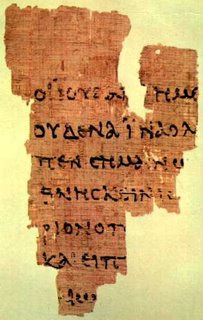
An edict made on February 3, 303 would have far reaching consequences. Not only would many Christians die as a result of that edict, but the better part of two millennia later we would benefit from a rich treasure.
Diocletian, emperor of Rome, issued an edict ordering the destruction of all Christian churches and burning all Christian books. All Christian communities felt the effects of this edict, but hardest hit were the Christians living in Palestine, North Africa, and Egypt. Over the previous years, Christians in those communities, with permission from the governing authorities, bought property and built churches. These churches were destroyed. Authorities searched, found and burned Christian documents, including Old Testament and New Testament manuscripts. In Africa, Alexandria was hardest hit.
Many Christians complied with this order and turned over Bibles and other Christian literature. But others fled to rural areas. Bishop Peter fled to Oxyrhynchus. Others fled to this rural town and to the areas surrounding it. The persecution follow them. While many handed over Scriptures, there were others, like Emeritus, a reader at his local church, who refused to comply and were jailed because of that. Christians like Emeritus hid manuscripts inside the walls of their homes, in caves, and other places.
It was these people, in rural Egypt, that we owe a debt of gratitude to. These people were responsible for preserving the New Testament Scriptures. Later, when the persecution was lifted, the manuscripts saved by these people would be used to create copies of Scriptures to be distributed throughout the Roman empire. Further, many of the Scriptures hidden in walls, caves, and elsewhere, would be discovered in the 1800s and 1900s. These manuscripts, many of which date from before 300 AD, would revolutionize New Testament studies and provide ways to verify the words and the text of the originally published copies of documents that comprise the New Testament.